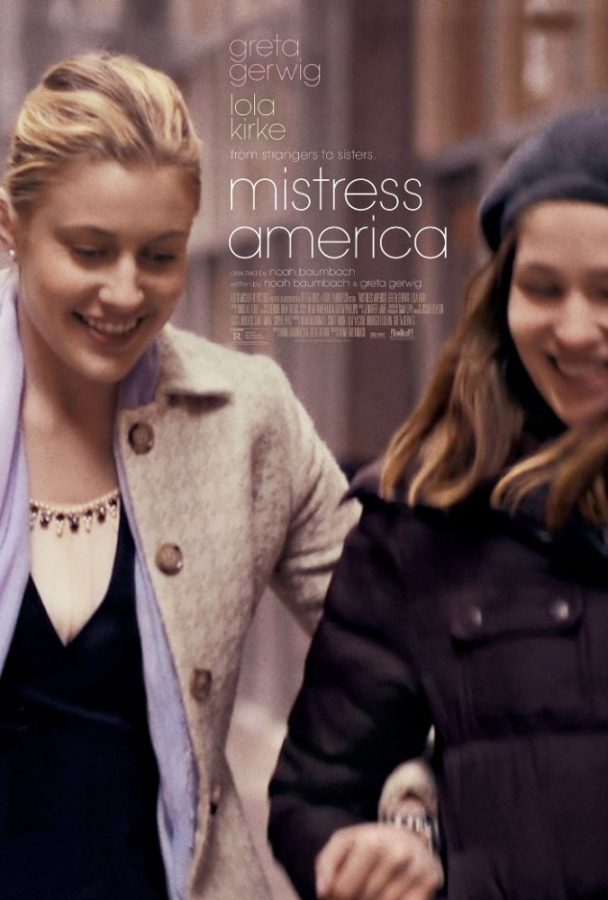According to a survey conducted by the American Trends Panel, 8 percent of Millennials identify themselves as the “Greatest Generation”.
To many, this would appear a hasty assumption. Even the oldest Millenials have yet to reach their midlife crises. Still, many Millenials believe that they’ve accomplished enough to be labeled as the greatest generation of all time. It’s this kind of anything-is-possible, sometimes to a delusional extent, Millennial that Noah Baumbach celebrates in his latest film, “Mistress America.”
Oftentimes, it feels like college is life’s Easy-Bake Oven: students enter one side as uncooked ingredients, fresh and ready to be shaped, and exit the other side, burnt but ready to present themselves to the world as beautiful and delicious.
There’s this overriding feeling that four years of college will transform them exactly into who they desire to be. This is the predicament facing Tracy (Lola Kirke) as she struggles through her first year of college.
Tracy embarks on her journey, hoping for a textbook-transformative experience, and instead finds college life to be awkward and difficult. She can’t shake the feeling that her experience will always persist as “that feeling of being at a party where you don’t know anyone…” Enter Brooke, aka Mistress America.
Brooke Cardinas, played by Baumbach’s muse, Greta Gerwig, is the idealized Millennial. Mix the good and the bad, add a dash of charming, and you have Gerwig’s Brooke. Tracy’s mom is marrying Brooke’s father, and thus begins a blossoming relationship between the two future stepsisters.
“Mistress America” is the funniest movie of 2015, and Brooke acts as its engine. She brings the heat from the moment the camera lays eyes on her in Times Square as she proclaims, “Welcome to New York City!” and proceeds to awkwardly walk down an entire set of stairs with arms upraised.
The humor is often subtle or clever—“I’m an autodidact. … That’s one of the words I self-taught myself!”—and Brooke provides a constant stream of laughter.
Brooke introduces Tracy to the possibilities life holds for the young and adventurous in New York. Unknown concerts, late-night parties and illegal commercially-zoned apartments hypnotize Tracy. These pit stops add to the frenetic pace of the film.
Baumbach’s scenes flitter in and out at the speed of a View-Master. Click—Tracy goes to a spin class, where Brooke is an instructor. Click—they tour Brooke’s future restaurant. Click—they visit a residential area where Brooke moonlights as a tutor. The scenes, dialogue and jokes wash over in a torrent of entertainment. The film never pauses to catch its breath, mirroring Brooke’s life.
The plot revolves around Brooke’s fight to open a restaurant and Tracy’s attempt to find a place both in college and in life. To solidify a place in the college ecosystem, Tracy hopes to join her university’s prestigious literary society. After her first story gets rejected, she uses the fuel of her interactions with Brooke to write a new story called “Mistress America.”
Meanwhile, Brooke’s restaurant deal collapses, forcing her to search for new investments from old friends. The second half of the movie takes place at the suburban home of Brooke’s old friend Mamie-Claire (Heather Lind) and old flame Dylan (Michael Chernus) as Brooke attempts to secure their investment to save her restaurant.
“Mistress America” acts as a character study into the greatest Millennial imaginable. Brooke captures the duality of positives and negative of the Millennial generation. She is a Renaissance woman who dabbles in a little bit of everything, from cooking, to fitness instruction, to tutoring. Yet, this often leads to her life being more style than substance.
Brooke will start anything but finish nothing. She acts as a Millennial guru — a hack of a guru, but nonetheless one who is able to pull truth and beauty out of every moment in life. This wisdom comes at a price: to see everything with crystal clarity, Brook sees herself as the center of the universe.
Brooke falls under the category of a person you want to be like, but not be. To the younger, such as Tracy, she is the role model of who to grow into. For the older, such as her old flame Dylan, Brooke represents a lost youth: untamable and always in the center of what’s happening. Yet Brooke cannot see herself.
At one point, Brooke brushes off a girl from high school, whose feelings she hurt, and later on proclaims, “You do not get to decide what’s hurtful and not hurtful. Only I get to do that. Of course it’s possible to hurt me. I’m the most sensitive person!” Tracy and Brooke suffer a falling out over her story of “Mistress America,” largely because Tracy points out the things Brooke is unwilling or unable to see about herself.
In the end, Brooke moves on from the restaurant, albeit on her terms rather than taking a bailout from Dylan. Her next plan includes jetting off to Los Angeles to follow her life plan so far. “I’ll probably end up doing something depressing, but young,” she says. Brooke reconciles with Tracy and describes to her latest affliction, one which seems to afflict every Millennial nowadays:
“I have a sickness without a name. I stare at Internet, want to not stare at it and do meaningful things, lie about how I spend my time, and then get so happy about everything for like a week that I just can’t handle it.”
Brooke may not be perfect, but she would certainly fall under the 8 percent that believe the Millennials are already the greatest generation. In the words of Tracy, people are just the matches to her bonfire.
Follow Alex Furrier on Twitter.









